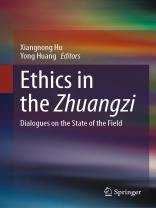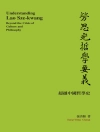This book delves into a broad range of hitherto unresolved issues related to Zhuangzi’s ethics, which include, but are not limited to, the fundamental question of whether Zhuangzi should be regarded as a moralist in the ordinary sense and what Zhuangzi’s views on topics such as equality, moral relativism, good life, intersubjective relations, and social harmony really are. The twelve contributors to this book deliberate on these issues in six debates centering on recent influential publications in the field. In each debate, the relevant publications will be first challenged by their critic and then defended by their author, through which different and competing interpretations of Zhuangzi’s ethical themes will directly confront each other. These author-meets-critic debates will not only reflect what is currently at stake in discussing Zhuangzi’s ethics but also engage and enrich the state of the field today. This volume serves as a good companion to scholars, as well as graduate-level students, who are interested in gaining philosophical and ethical insights from Zhuangzi and Chinese philosophy in general.
Jadual kandungan
1 Introduction.- 2 How is Zhuangzi not a Relativist? A Critique of David Wong’s Interpretation of Zhuangzi as a Pluralistic Relativist.- 3 The Open Text of the Zhuangzi.- 4 Zhuangzi’s “Difference Stories” and Patient Moral Relativism.- 5 Difference Stories and Patient Moral Relativism in the Zhuangzi:
A Response to Waldemar Brys.- 6 Ethics and Normativity in Zhuangzi: A Commentary on Jung Lee’s Ethics of Attunement.- 7 The Art of the Way: Toward a Dao-Centered Ethics in the Zhuangzi.- 8 A Zhuangzi Who Is Attentive to the World of Man: Rethinking Zhuangzi’s Ethics in the Light of Eske Møllgaard’s Interpretation.- 9 Zhuangzi, the Criminals, and Kant.- 10 The Limit of the Skill Paradigm: A Critique on Chris Fraser’s ethics of dao and de.- 11 How Dao and De Can Shape a Plausible Zhuangist Ethics.- 12 To Argue as Zhuangzi Argues: On Steve Coutinho’s Interpretation of Ethics in the Zhuangzi.- 13 Vastness, Penumbrae, and Ethics in the Zhuangzi: A Response to Robert Tsaturyan.
Mengenai Pengarang
Xiangnong Hu received his Ph.D. in Philosophy from The Chinese University of Hong Kong and is currently a Young Associate Researcher (Assistant Professor) of the School of Philosophy at Fudan University. He has been selected as a member of the Magnolia Talents Program of Shanghai and has been the recipient of several scholarships and academic awards issued by the Research Grants Council of the Hong Kong SAR Government and The Chinese University of Hong Kong. He works principally on Chinese and comparative ethics, with special focus on ancient Confucianism, Zhuangzi, contemporary virtue ethics, and Kant. His writings on these subjects appear in Asian Philosophy, Asian Studies, The Journal of East Asian Philosophy, and Dao Companion to the Philosophy of Mencius.
Yong Huang, Ph.D. in Philosophy (Fudan University) and Th.D. in Religious Studies (Harvard University), is currently the Chairman and Professor of the Department of Philosophy at The Chinese University of Hong Kong. He is the founding editor-in-chief of Dao: A Journal of Comparative Philosophy and has launched several book series, including Dao Companions to Chinese Philosophy, Encountering Chinese Philosophy, Philosophy from Hong Kong, and the ACPA Series in Chinese and Comparative Philosophy. He has served as the Co-Chair of the Confucian Tradition Group of the American Academy of Religion, the Co-Chair of the University Seminar on Neo-Confucian Studies at Columbia University, and the President of The Association of Chinese Philosophers in America. In addition, he also sits on almost 30 editorial boards of scholarly journals and book series in English and Chinese. With an interest in both philosophy and religious studies and familiar with both Western and Chinese traditions, his research focuses on ethical and political issues from an interdisciplinary and comparative perspective.












